Watch Video on How to Entry in Tally Accounting Program Software.
You can provide unique voucher numbers for your purchase vouchers, and use a new series of voucher numbering.
Local purchase
The purchase of goods or services from a supplier in the same state attracts central tax and state tax.
1. Go to Gateway of Tally > Accounting Vouchers > F9: Purchase .
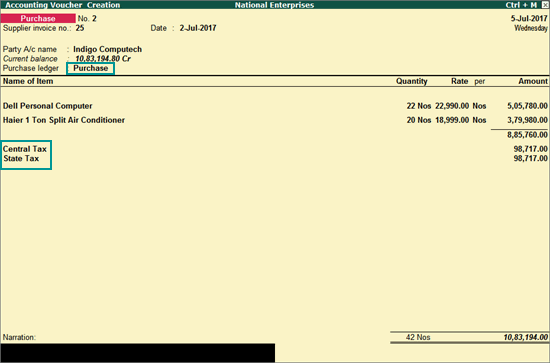
Supplier invoice no.: Enter the sales invoice no. of the supplying party.
Date: Enter the date on which the sales invoice was passed by the supplier.
2. In Party A/c name , select the supplier's ledger or the cash ledger.
3. Select the purchase ledger applicable for local taxable purchases.
4. Select the required items, and specify the quantities and rates.
5. Select the central and state tax ledgers.
You can view the tax details by clicking A : Tax Analysis . Click F1 : Detailed to view the tax break-up.
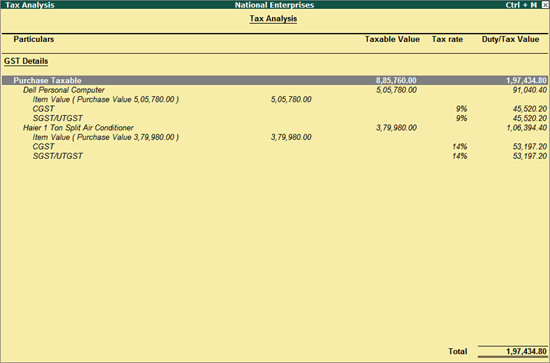
Mismatch in Central Tax and State/UT Tax values
If the Central Tax and State/UT Tax values do not match in the transaction, a warning message appears as shown:
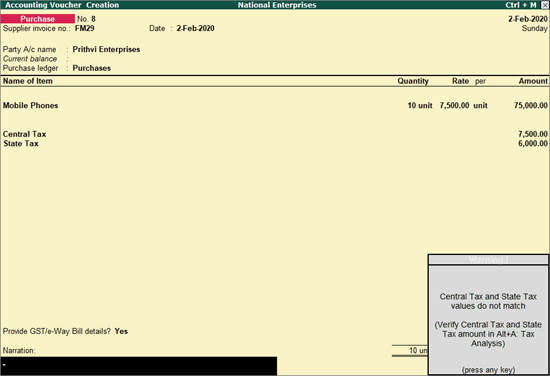
The same information will appear in the following screens:
● In the Tax Analysis screen as a note, as shown below:
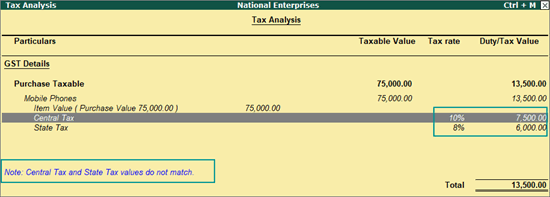
● The warning message will appear when you press Alt+P to print the voucher.
The GST portal will not accept the GST returns if:
● The value of State Tax does not match with Central Tax value.
● The value of UT Tax does not match with Central Tax value, when a Union Territory is selected in the company's State field, or the company is an assessee of other territory.
This message will appear when there is a mismatch in Central Tax and State/UT Tax values, in transactions recorded in the invoice mode of purchase, debit note, and credit note. You need to correct the GST rates and values, as applicable , before saving and/or printing the invoice.
Interstate Purchase
The purchase of goods or services from a supplier from another state attracts integrated tax.
● Follow the steps used for recording a local purchase transaction , with the following changes:
o Select the purchase ledger applicable for interstate purchases.
o Select the integrated tax ledger.
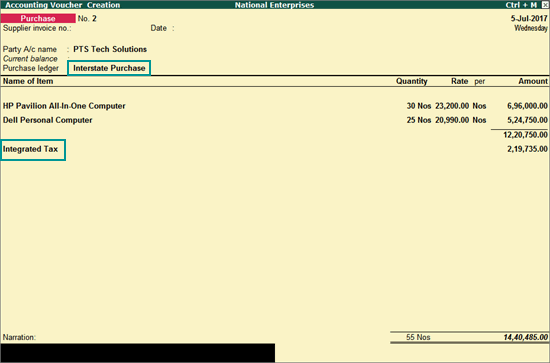
Depending on the location of the supplier, you can record a local or interstate purchase transaction with the applicable GST rates.
Purchase of Fixed Assets
You can record taxable or exempt purchases of fixed assets (capital goods).
1. Go to Gateway of Tally > Accounts Info. > Ledgers > Create .
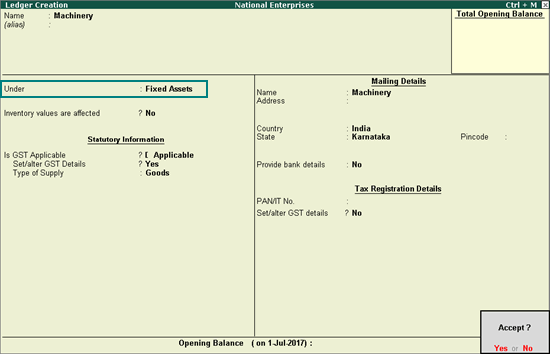
2. Group it under Fixed Assets .
3. Select the required Nature of transaction . You can select the following natures of transaction for capital goods:
● Imports Exempt
● Imports Taxable
● Interstate Purchase Exempt
● Interstate Purchase From Unregistered Dealer - Services
● Interstate Purchase Taxable
● Purchase Deemed Exports - Exempt
● Purchase Deemed Exports - Taxable
● Purchase Exempt
● Purchase From SEZ - Exempt
● Purchase From SEZ - Taxable
● Purchase From SEZ (Without Bill of Entry) - Exempt
● Purchase From SEZ (Without Bill of Entry) - Taxable
● Purchase From Unregistered Dealer - Exempt
● Purchase From Unregistered Dealer - Nil Rated
● Purchase From Unregistered Dealer - Taxable
● Purchase Taxable
4. Select the Nature of goods as Capital Goods .
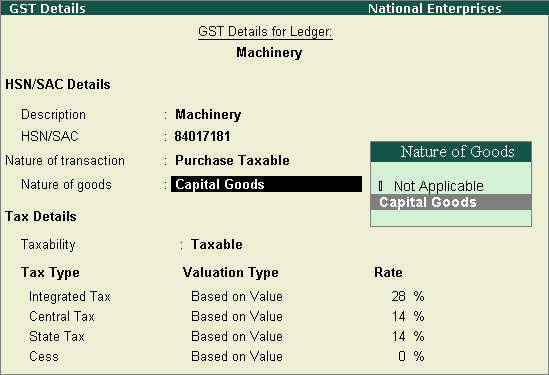
5. Accept the GST Details screen.
6. Press Enter to save.
To record the purchase of fixed asset
1. Go to Gateway of Tally > Accounting Vouchers > F9: Purchase .
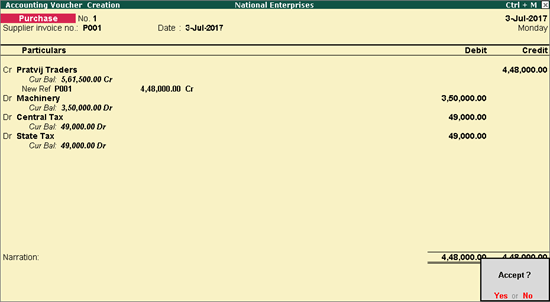
2. Click F12: Configure > F12: Advanced > set Allow expenses/fixed assets in purchase vouchers to Yes .
3. Enter the Supplier invoice no. and Date .
4. Credit the party ledger, and enter the fixed asset value inclusive of tax.
5. Debit the fixed asset ledger and enter the assessable value.
6. Debit the tax ledgers and enter the tax amount.
7. Press Enter to save.
Purchase of fixed assets
Go to Gateway of Tally > Accounting Vouchers > F9: Purchase > click I : Accounting Invoice .
Record purchase of fixed assets in accounting invoice with GST ledgers as shown:
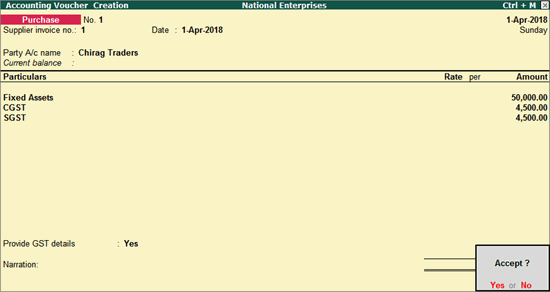
Voucher for depreciation
Record the depreciation voucher before recording the sale of fixed assets.
Go to Gateway of Tally > Accounting Vouchers > F7: Journal .
1. Debit the depreciation ledger grouped under expenses, and enter the value of depreciation.
2. Credit the Fixed asset ledger.
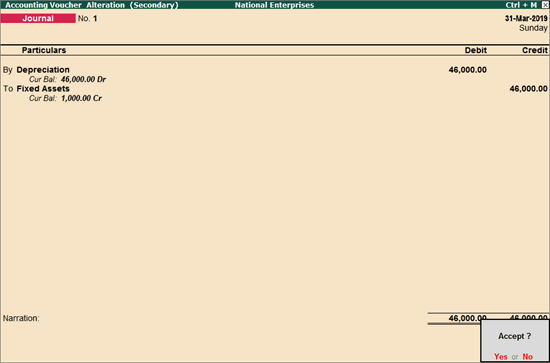
3. Press Enter to save.
Sale of fixed assets
Go to Gateway of Tally > Accounting Vouchers > F8: Sales > click I : Accounting Invoice .
Ensure the ledger used for sale of fixed assets is grouped under Sales Accounts . Record sale of fixed asset in accounting invoice, by selecting the GST ledgers based on the party's Place of Supply .
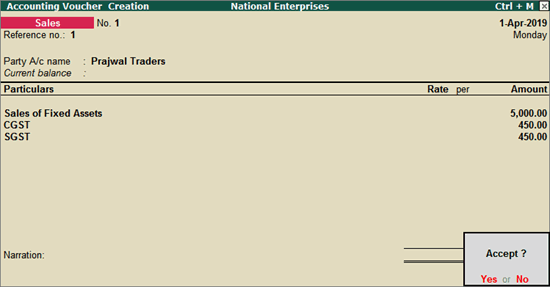
This sale value will appear in your trading account and Sales Register . As the sale is of fixed asset, you need to transfer this amount to fixed asset ledger, to form part of the Balance Sheet .
Note: Sale of fixed asset can be recorded in journal voucher as shown below, but you cannot generate the sales invoice.
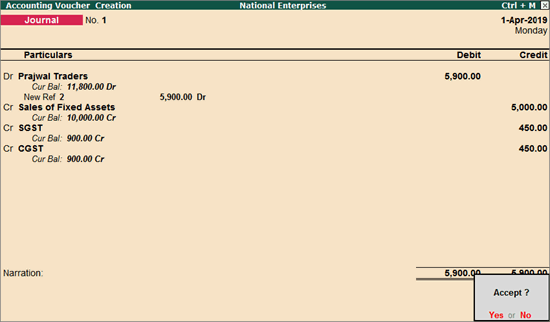
View details in GST report
Go to Gateway of Tally > Display > Statutory Reports > GST > GSTR-1 .
If the fixed asset is sold to:
● Registered dealer, the details will appear under B2B Invoices.
● Unregistered dealer, the details will appear under B2C Invoices.
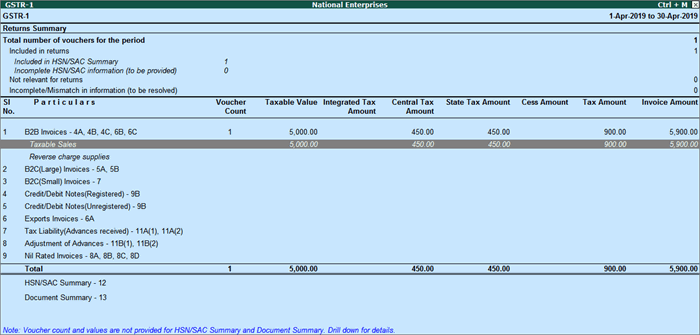
View details in Balance Sheet
Balance sheet appears as shown:
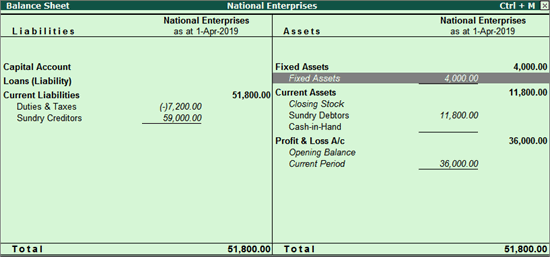
Journal entries for adjusting profit or loss on sale of fixed assets
Account for profit on sale of fixed asset
Transfer the profit to income ledger to reflect the actual value of fixed assets in Balance sheet.
Example: After charging depreciation on fixed assets, if the net value of the fixed assets is 4,000 and the sale value is 5,000, record a Journal voucher to transfer the profit as given below:
Debit: Sale of Fixed assets = 5,000
Credit: Fixed Assets = 4,000
Credit: Indirect Income = 1,000
Account for loss on sale of fixed asset
Transfer the loss to expense ledger to reflect the actual value of fixed assets in Balance sheet.
Example: After charging depreciation on fixed assets, if the net value of the fixed assets is 5,000 and the sale value is 4,000, record a Journal voucher to transfer the loss as given below:
Debit: Sale of Fixed assets = 4,000
Debit: Indirect Expenses = 1,000
Credit: Fixed Assets = 5,000


